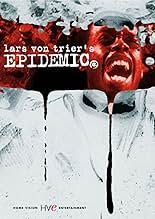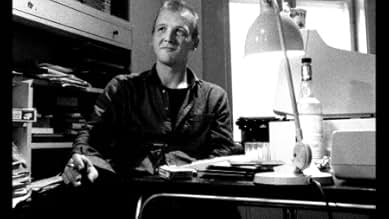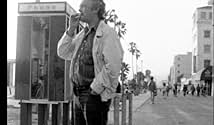Epidemic
NOTE IMDb
5,9/10
6,5 k
MA NOTE
Un réalisateur et scénariste écrit un scénario et, ce faisant, brouille la frontière entre fiction et réalité.Un réalisateur et scénariste écrit un scénario et, ce faisant, brouille la frontière entre fiction et réalité.Un réalisateur et scénariste écrit un scénario et, ce faisant, brouille la frontière entre fiction et réalité.
- Réalisation
- Scénario
- Casting principal
- Récompenses
- 1 nomination au total
Avis à la une
10ooeht
Of course, you gotta be a masochist to enjoy some people's genius - you know that if you bear with them they will take you to new levels of perception.
With Lars von Trier, the voyage is often hilarious. Epidemic is funny. Funny, in a Gummo kind of way: the characters are real, reality is eerie, and we laugh to break the tension; funny in a the characters say amusing things kind of way (preacher: "this bible is in goddamned Latin"); and funny in an Andy Kaufman screwing with the audience (yes, you) kind of way.
Make no mistake: you will suffer. If you are afraid, stay away from horror movies, ya pansy!
This movie also features some great aesthetic distance! It's bold!
With Lars von Trier, the voyage is often hilarious. Epidemic is funny. Funny, in a Gummo kind of way: the characters are real, reality is eerie, and we laugh to break the tension; funny in a the characters say amusing things kind of way (preacher: "this bible is in goddamned Latin"); and funny in an Andy Kaufman screwing with the audience (yes, you) kind of way.
Make no mistake: you will suffer. If you are afraid, stay away from horror movies, ya pansy!
This movie also features some great aesthetic distance! It's bold!
Look, I know a substantial proportion of the American population get a little hot under the collar when funny-talking foreigners start criticising the American government and way of life, but hey - when you're the only country in the world inclined to and capable of dictation of world policy, you gotta take it on the chin. While Von Trier even makes me wince sometimes (the end credits to Dogville for instance), it's his point of view and is worthy of thought. He isn't here to lick your derrière clean for you - if you can't take a little criticism of the homeland, I'd steer clear of any imported movies for a while. Anyhoo, when truly disrespectful films like Titanic break records and reap awards with nary a raised eyebrow, it's double standards to expect non-US films to walk the line you'd like. Von Trier is a genius film-maker... you may not agree with his politics, but you cannot doubt his talent.
Epidemic appears to be all stylistic self-indulgence. It is filmed in black and white, with often purposely redundant subtitles. Each shot is very very long. Some are stoic, some are suddenly goofy, some are disturbing, mostly stoic. When there is dialogue, it is intellectually stimulating, but borderline irrelevant.
Mainly, it is that director Lars Von Trier and his screenplay collaborator Niels Vorsel play themselves, coming up with a last-minute script for a producer. This strand takes disproportionate turns with scenes from their script, in which Von Trier plays a radical doctor attempting to cure a modern-day epidemic. In an warped turn, the doctor finds that he himself has been spreading it. For so long, one is left without a clue as to why there is such a coincidence between the screenplay and the outside world, or any progressions of the different narrative strands' signifying signs. But it infects you. It burns you.
Whether or not the film is narcissistic, it is not form over function. Essentially, it is a basic exercise in what metaphysically affects the viewer. Consider the scene of the darker, quieter of the screenwriters in the subway, knowing predeterminately that the other one is going to die. Or when he looks in a mirror, turns to us, the camera, then the mirror again. Everything one expects would create a cohesive, sense-making narrative film is inverted and indeed develops an immediately conscious connection between itself and the audience.
That is not to say it eschews any fundamental aspect of quality. Udo Kier delivers one of the most amazing, fantastic performances I have ever seen. Really, many of the performances, whoever these actors, or characters, are, shock and deeply move us. Some scenes are entirely made up of uproarious laughter or breakdowns of screaming, in spite of the unapologetic stoicism and quiet permeating the film.
This hypnotic abstraction is truly very atmospheric and creepy. It is a transcendental, almost physiologically affecting virus that infests you for days upon being subjected to it. It is something that has to be seen and can hardly be explained. And that makes it a true work of art.
Mainly, it is that director Lars Von Trier and his screenplay collaborator Niels Vorsel play themselves, coming up with a last-minute script for a producer. This strand takes disproportionate turns with scenes from their script, in which Von Trier plays a radical doctor attempting to cure a modern-day epidemic. In an warped turn, the doctor finds that he himself has been spreading it. For so long, one is left without a clue as to why there is such a coincidence between the screenplay and the outside world, or any progressions of the different narrative strands' signifying signs. But it infects you. It burns you.
Whether or not the film is narcissistic, it is not form over function. Essentially, it is a basic exercise in what metaphysically affects the viewer. Consider the scene of the darker, quieter of the screenwriters in the subway, knowing predeterminately that the other one is going to die. Or when he looks in a mirror, turns to us, the camera, then the mirror again. Everything one expects would create a cohesive, sense-making narrative film is inverted and indeed develops an immediately conscious connection between itself and the audience.
That is not to say it eschews any fundamental aspect of quality. Udo Kier delivers one of the most amazing, fantastic performances I have ever seen. Really, many of the performances, whoever these actors, or characters, are, shock and deeply move us. Some scenes are entirely made up of uproarious laughter or breakdowns of screaming, in spite of the unapologetic stoicism and quiet permeating the film.
This hypnotic abstraction is truly very atmospheric and creepy. It is a transcendental, almost physiologically affecting virus that infests you for days upon being subjected to it. It is something that has to be seen and can hardly be explained. And that makes it a true work of art.
Epidemic (1987), directed by Lars von Trier, is a meta-cinematic exploration of the blurred line between fiction and reality. The film follows a director and screenwriter who, while working on a script about a plague, find themselves caught up in a real-life epidemic, mirroring the events they are writing. This film is a challenging and unconventional piece of work, characteristic of von Trier's early style, marked by its fragmented narrative and philosophical underpinnings.
The performances are fittingly restrained, with Allan De Waal and Ole Ernst bringing a sense of detachment and intellectual depth to their characters, reflecting the film's thematic concerns. The film's low-budget aesthetic, with shaky handheld camerawork and raw sound design, serves to reinforce the sense of chaos and uncertainty that permeates the narrative. It's a deliberate stylistic choice that enhances the surreal, almost documentary-like atmosphere, but it may be off-putting to some viewers who prefer more polished filmmaking.
Von Trier's direction is methodical, and while the premise of the film offers intriguing possibilities, the execution can feel disjointed and unclear at times. The dialogue often veers into abstract territory, and the narrative structure is fragmented, leaving viewers to piece together the meaning behind the events. The film's slow pace, combined with its minimalistic style, can make it feel like a deliberately inaccessible work, challenging the audience's patience.
Epidemic is a film that operates on multiple levels, blending political, artistic, and existential commentary with a quasi-documentary style. While it offers some thought-provoking moments, it struggles to maintain coherence and impact over its runtime. It is best suited for those interested in avant-garde cinema or those looking to delve into the early works of Lars von Trier, but casual viewers may find it frustrating.
Rating: 6/10. A provocative, if uneven, exploration of the intersection between art, reality, and societal collapse.
The performances are fittingly restrained, with Allan De Waal and Ole Ernst bringing a sense of detachment and intellectual depth to their characters, reflecting the film's thematic concerns. The film's low-budget aesthetic, with shaky handheld camerawork and raw sound design, serves to reinforce the sense of chaos and uncertainty that permeates the narrative. It's a deliberate stylistic choice that enhances the surreal, almost documentary-like atmosphere, but it may be off-putting to some viewers who prefer more polished filmmaking.
Von Trier's direction is methodical, and while the premise of the film offers intriguing possibilities, the execution can feel disjointed and unclear at times. The dialogue often veers into abstract territory, and the narrative structure is fragmented, leaving viewers to piece together the meaning behind the events. The film's slow pace, combined with its minimalistic style, can make it feel like a deliberately inaccessible work, challenging the audience's patience.
Epidemic is a film that operates on multiple levels, blending political, artistic, and existential commentary with a quasi-documentary style. While it offers some thought-provoking moments, it struggles to maintain coherence and impact over its runtime. It is best suited for those interested in avant-garde cinema or those looking to delve into the early works of Lars von Trier, but casual viewers may find it frustrating.
Rating: 6/10. A provocative, if uneven, exploration of the intersection between art, reality, and societal collapse.
"Epidemic" is, at its heart of hearts, a movie about making movies. As such it challenges the relation between fiction and reality. The two are not statically established realms, self contained in their clearly contained functional domains but they are dynamically interacting at all levels and at all times. The result is a movie in which the narrative structure is dual and of a meandering nature, climaxing in what could be a merge between a programmed project that involves human intellectual intervention- the movie within the movie- and the outbreak of a natural phenomenon with its catastrophic consequences- the epidemic.
Styllistically, "Epidemic" is very much a Lars Trier movie and it shows. From the apparently disconnected flow of scenes to mix of gritty realism with allegory, the director imprints his very personal mark in all elements of "Epidemic". Its very structure attests to this and the imagery reflects it in a very overt manner. "Epidemic" seems to be a playing ground of sorts in which Lars von Trier experiments as much as possible and in trying different things creates a diverse mismatch of scenes that not always work completely well together although they create an atmosphere.
As the process of coalescence between "fiction" and "reality" (this reality being, of course, fictional in itself which adds another layer of complexity and challenges the very notion of the third and fourth walls) heightens the narrative frame shrinks from the stage that is Europe to a small room. The claustrophobia of the later phase of the movie bring the full impact of the plague to the viewer's attention via a limited sample of the population that permits a personal experience of it all.
Much like Bergman's "The Seventh Seal", the plague in question is to be read on many levels and very much like the Swedish director's movie, "Epidemic" is not for everyone. Those who find it interesting, however, may have a strangely riveting experience upon watching this clearly unconventional movie that pushes many borders even if does not do so in a completely coherent manner.
Styllistically, "Epidemic" is very much a Lars Trier movie and it shows. From the apparently disconnected flow of scenes to mix of gritty realism with allegory, the director imprints his very personal mark in all elements of "Epidemic". Its very structure attests to this and the imagery reflects it in a very overt manner. "Epidemic" seems to be a playing ground of sorts in which Lars von Trier experiments as much as possible and in trying different things creates a diverse mismatch of scenes that not always work completely well together although they create an atmosphere.
As the process of coalescence between "fiction" and "reality" (this reality being, of course, fictional in itself which adds another layer of complexity and challenges the very notion of the third and fourth walls) heightens the narrative frame shrinks from the stage that is Europe to a small room. The claustrophobia of the later phase of the movie bring the full impact of the plague to the viewer's attention via a limited sample of the population that permits a personal experience of it all.
Much like Bergman's "The Seventh Seal", the plague in question is to be read on many levels and very much like the Swedish director's movie, "Epidemic" is not for everyone. Those who find it interesting, however, may have a strangely riveting experience upon watching this clearly unconventional movie that pushes many borders even if does not do so in a completely coherent manner.
Le saviez-vous
- Crédits fousThe film's title appears in red letters in the upper left corner of the screen for the entire length of the film.
- ConnexionsFeatured in The Making of 'Europa' (1991)
- Bandes originalesTannhäuser (The Overture)
Composed by Richard Wagner
Meilleurs choix
Connectez-vous pour évaluer et suivre la liste de favoris afin de recevoir des recommandations personnalisées
- How long is Epidemic?Alimenté par Alexa
Détails
Box-office
- Montant brut mondial
- 938 $US
- Durée1 heure 46 minutes
- Couleur
- Mixage
- Rapport de forme
- 1.66 : 1
Contribuer à cette page
Suggérer une modification ou ajouter du contenu manquant



















